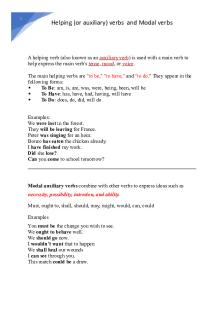Helping verbs - Prepared English language worksheets to be administered for teaching elementary PDF

| Title | Helping verbs - Prepared English language worksheets to be administered for teaching elementary |
|---|---|
| Author | Sreedevi Arun |
| Course | English Language Teaching |
| Institution | Annamalai University |
| Pages | 3 |
| File Size | 126.3 KB |
| File Type | |
| Total Downloads | 88 |
| Total Views | 150 |
Summary
Prepared English language worksheets to be administered for teaching elementary students about grammar concepts....
Description
3
Helping (or auxiliary) verbs and Modal verbs
A helping verb (also known as an auxiliary verb) is used with a main verb to help express the main verb's tense, mood, or voice. The main helping verbs are "to be," "to have," and "to do." They appear in the following forms: To Be: am, is, are, was, were, being, been, will be To Have: has, have, had, having, will have To Do: does, do, did, will do Examples: We were lost in the forest. They will be leaving for France. Peter was singing for an hour. Bonzo has eaten the chicken already. I have finished my work. Did she lose? Can you come to school tomorrow?
Modal auxiliary verbs combine with other verbs to express ideas such as necessity, possibility, intention, and ability. Must, ought to, shall, should, may, might, would, can, could Examples You must be the change you wish to see. We ought to behave well. We should go now. I wouldn’t want that to happen We shall heal our wounds I can see through you. This match could be a draw.
3
Helping (or auxiliary) verbs and Modal verbs Helping Verbs and Verb Phrases
A "verb phrase" is made up of the helping verb(s) and the main verb. In the examples below, the verb phrase is shaded with main verb in bold: They have been drinking since breakfast. Lee is fishing for mackerel. Be aware that any adverbs which appear alongside or inside the verb phrase are not part of the verb phrase. For example: They have been drinking heavily since breakfast. (The adverb "heavily" is not part of the verb phrase.) Lee is definitely fishing for mackerel. (The adverb "definitely" is not part of the verb phrase.)
To sum up, the list of helping verbs includes Am, is, are, was, were, be, been, being, do, does, did, has, have, had, may, might, shall, should, will, would, can, could, must, ought to
Underline the helping and/or main verbs. 1. I am doing well. 2. You are awesome. 3. They are sweet. 4. He is handsome. 5. I can read books 6. He should go to school. 7. You must come to the party. 8. We will go to Nainital next year. 9. I would love to go with you. 10.I shall meet you at the entrance. 11.I could use some help. 12.My aunt might visit us next week. 13.You may go now.
3
Helping (or auxiliary) verbs and Modal verbs 14.Don't breathe out until I say. 15. Ira has gone to a hotel. 16. Milka can whistle loudly. 17.Gabriel was bouncing off the walls. 18.The iphone was broken when it fell. 19. Should I leave now? 20.Will you visit me at school?...
Similar Free PDFs

English Language Teaching
- 9 Pages

English Language Teaching
- 7 Pages

English Language Teaching
- 16 Pages

Teaching English to children
- 119 Pages

Teaching English to Young Learners
- 62 Pages
Popular Institutions
- Tinajero National High School - Annex
- Politeknik Caltex Riau
- Yokohama City University
- SGT University
- University of Al-Qadisiyah
- Divine Word College of Vigan
- Techniek College Rotterdam
- Universidade de Santiago
- Universiti Teknologi MARA Cawangan Johor Kampus Pasir Gudang
- Poltekkes Kemenkes Yogyakarta
- Baguio City National High School
- Colegio san marcos
- preparatoria uno
- Centro de Bachillerato Tecnológico Industrial y de Servicios No. 107
- Dalian Maritime University
- Quang Trung Secondary School
- Colegio Tecnológico en Informática
- Corporación Regional de Educación Superior
- Grupo CEDVA
- Dar Al Uloom University
- Centro de Estudios Preuniversitarios de la Universidad Nacional de Ingeniería
- 上智大学
- Aakash International School, Nuna Majara
- San Felipe Neri Catholic School
- Kang Chiao International School - New Taipei City
- Misamis Occidental National High School
- Institución Educativa Escuela Normal Juan Ladrilleros
- Kolehiyo ng Pantukan
- Batanes State College
- Instituto Continental
- Sekolah Menengah Kejuruan Kesehatan Kaltara (Tarakan)
- Colegio de La Inmaculada Concepcion - Cebu










